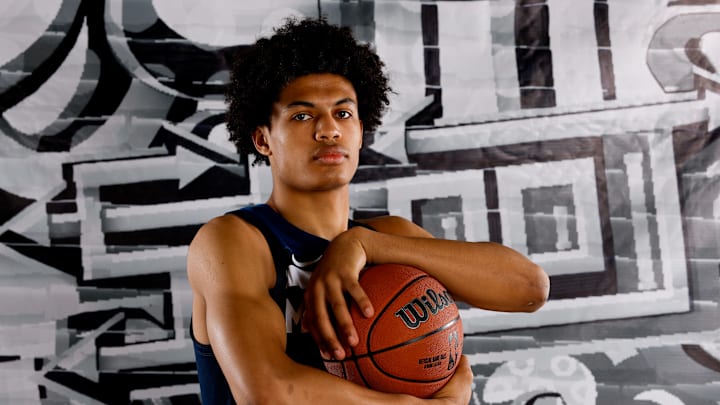After just four years of basketball experience, Joan Beringer showed exactly why he was selected 17th overall by Minnesota, starring in summer league play. Beringer made an immediate impact in his summer league debut, scoring 11 points, grabbing eight rebounds, and a monster six blocks, turning back every shot near the rim.
This performance not only put Timberwolves fans on notice, but the whole league, outperforming draft-mate and 13th overall pick Derik Queen. In four summer league games, Beringer averaged 2.5 blocks per game in just 23 minutes – a promising sign for the rookie.
As mentioned, Beringer is fairly new to the game of basketball. Growing up in France, Beringer played soccer in his youth until giving basketball a try at 15. While Beringer presents strong physical tools, the lack of overall basketball experience could lead to a longer development timeline for the young big.
Beringer provides a traditional center skillset, with rim-running and paint deterrence being his greatest skills. Beringer enters the league as one of the youngest players at 18, turning 19 on November 11.
While many Timberwolves fans are very intrigued with what Beringer could provide following his strong summer league, it may be more valuable to stay patient with his development and not rush to play him.
Still a ways to go
In totality, Beringer had a very strong summer league, but there were two glaring areas of growth – physicality and excessive fouling.
In just 23 minutes per game, Beringer averaged 4.5 fouls per game, most of which occurred against bigger, more physical forwards and centers. When matched up in the post with these more physical bigs, Beringer would have to foul in order not to allow an easy basket after being backed down.
His summer league struggles would only be amplified against bigs like Nikola Jokić, Alperen Şengün, and Domantas Sabonis. Logging minutes against these more physical big men could be an extreme detriment to the team, placing them in quick foul trouble and giving up points at the charity stripe.
While letting Beringer work through these mistakes would be fine for a bad team, Minnesota is competing in a competitive Western Conference and simply doesn't have the time for trial and error.
Minnesota must ask itself if developing Beringer immediately would outweigh the growing pains and learning moments that could be the deciding factor in wins and losses.
Learning from his fellow Frenchmen
Upon getting drafted, Beringer expressed his excitement about joining French basketball legend Rudy Gobert. The similar playstyle and French connection will surely be in favor of Beringer's development, but also seeing some of the flaws in Gobert's skillset can aid Beringer.
Of the glaring offensive flaws that Gobert has, the most detrimental are his hands and touch around the rim.
It is important to be cautious when watching summer league, but Beringer showed an ability to handle difficult passes in the pick-and-roll, as showing good touch around the rim. Once again, not much can be derived from summer league, but there are promising signs when it comes to these abilities for the rookie.
While Beringer may not want to pick up too much information offensively from Gobert, Beringer could quickly rise among the league's best rim protectors under the mentorship of Gobert.
The four-time defensive player of the year can build upon a strong foundation and build Beringer into a defensive player resembling himself. Gobert's rim-protecting and ability to make offensive players think twice about entering the paint are skills Beringer can apply to his own game.
While Gobert may not be the best at scoring on offense, Gobert is one of the best screeners in the league. Despite having a thinner frame compared to most bigs, Gobert is one of the most effective screeners in the league, generating open shots for ball handlers or creating four-on-five scenarios due to the effectiveness of the screen.
As Beringer continues to develop and grow into his frame, he could get a head start on developing skills as a screener by watching from the bench.
Patience is key
Minnesota investing heavy minutes into Beringer immediately could prove to be detrimental in the short and long-term. Playing Beringer would likely take minutes from one of the vets of the team, immediately dropping the floor of this Minnesota team.
Anthony Edwards and the Timberwolves are simply not in a position to be prioritizing development of youth over winning, as we saw this past season.
Beringer will likely be in a similar situation to previous Timberwolves first-round pick, Rob Dillingham. After being drafted eighth by Minnesota, after a draft night trade with San Antonio, Dillingham rarely saw the court for Minnesota in his rookie year.
Similar to Beringer, Dillingham sat behind 18-year veteran Mike Conley. With Conley and Dillingham sharing similar measurements, Dillingham had the opportunity to be mentored by one of the game's most experienced point guards.
Simply put, Beringer is not going anywhere. Beringer will have plenty of time to make his mark on the court in the coming seasons, but taking it slow in his rookie season could be in his and the Wolves' best interest.
